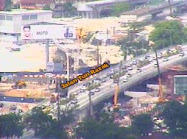Some of us would surely remember this era. Although we were kids then, we still feel the threat of a looming war, especially those living in Johore. The Government propaganda machine, TV and radio harp on this confrontation issue on a daily basis. Songs were taught in schools to us kids belittling Sukarno (I can still remember the songs).
Rumours were spreading like wild fires of the Indonesian Army invading us when news of some Indonesian Paratroopers were caught in Labis and Pontian. In fact the Indonesian Paratroopers who parachuted into the jungle surrendered because they were starving to death. Sukarno told them that the kampong folks would greet them with open arms and would help them to topple the government.
Sukarno was a great orator and once, he spoke for seven straight hours in front of the Indonesian crowd non-stop. Apart from Sukarno, only Cuban Fidel Castro and Anwar Ibrahim (!!!! haha) could captivate and manipulate their audiences with their oratory skills.
In my kampong it was a maze of activities when the Mat Salleh's foot soldier (Australian and British) make their rounds with their rifles. Sometimes i would try to chit chat with them in broken English. There were of course the feared Gurkhas with their Khukris and those hulks from the Polynesian Islands.
The Indonesian Confrontation (or Konfrontasi in Indonesian) was a small undeclared war fought from 1962 - 1966 through which President Sukarno of Indonesia tried to destroy the newly created nation of Malaysia. Sukarno was facing internal political struggle, so by invading Malaysia, their public focus was diverted.
Sukarno argued that the new nation was in fact just a way of maintaining British colonial influence in the area.
Indonesia had recently gained control of West Irian (formerly West New Guinea) from the Dutch, giving it a shared border with Australia in Australian-controlled Papua-New Guinea. Australia did not want any armed conflict with Indonesia on its border, but it also wanted a strong, united, anti-communist Malaysia.
But when Malaysia was created, Indonesia declared its opposition and hostility to it.
Indonesian President Sukarno was a militaristic, tough, nationalist, who was also trying to balance two great powers in his nation - the Communist Party of Indonesia (PKI), and the Army. He hoped that his opposition to Malaysia would keep both of them together and in support of him.
During 1963 the Indonesians sent small parties of regular and irregular soldiers to wage terrorist and propaganda actions in the former British areas of Borneo (Sarawak and Sabah). In 1964 they stepped up their actions to include raids on the Malaysian peninsula.
The Australian government was reluctant to commit its troops to actions against Indonesian soldiers, but finally decided to do so when repeatedly asked by the Malaysian government.
The main focus of Australian attention was in the Malaysian areas of Borneo (Sabah and Sarawak). Fighting was in difficult terrain and in an oppressive jungle climate. The troops were sited along the border to protect population centres from enemy attacks. But they also made frequent though secret incursions into Indonesian territory, forcing the Indonesians to defend themselves rather than be an attacking force.
There was very little press coverage in Australia at the time, because of the sensitivity of the operations and the cross-border activities. The Australian troops were all sworn to secrecy about having entered Indonesian territory, and it was not until 1996 that the ‘invasion’ was publicly admitted.
In 1965 Indonesian army leaders staged a coup against Sukarno, and massacred thousands of PKI members. Once firmly in command, they stopped the policy of Konfrontasi, and recognised the new nation of Malaysia in 1966.
The coup leader, General Suharto becomes the new dictator of Indonesia for more than a decade before he was toppled by the people's revolution a few years ago.May your soul rest in peace. Amin.















3 comments:
I have read your blog which was quite accurate.I was an australian soldier during Konfrontasi. We had one major action at Sungei Kesang near Malacca (we were based at Terendak)where we captured 50 odd indonesians and then we went to Sarawak. We had forts at Stass, Bukit Knuckle and Serekin and patrolled forward across the border some 10km with some success. It was hot, tiring and dangerous but after 6 months of constant operations we returned to Terendak by an English aircraft carrier which we drank dry. I will be going back to Kuching in August after an absence of 48 years so am interested to see what it will be like. Again, thanks for the blog. Jim Naylor
Jim Naylor, you are our war hero. You and others have selflessly sacrificed yourselves so we all could now live in safety and harmony. I salute you, sir.
Thanks for the kind comment Zac but we who were there certainly do not consider ourselves heroes by any stretch of the imagination. Notwithstanding your Governments awarding us a Pingat Jasa. We were young and were going for a holiday in Malaysia but Soekarno put an end to that. Malaysian holidays came after, when we were civilians.
I have just come back from 5 weeks there including a week in Kuching which I regard as the highlight. A truly beautiful city and the Pullman a beautiful hotel and the people wonderful but I needed to see the Orang Hutans before they lose their forest home which I did. Even my strangulated Bahasa Indonesian was accepted so your part of the world is free and truly remarkable so I'm happy that I played a small part in keeping it that way. Sampai berjumpa lagi
Post a Comment